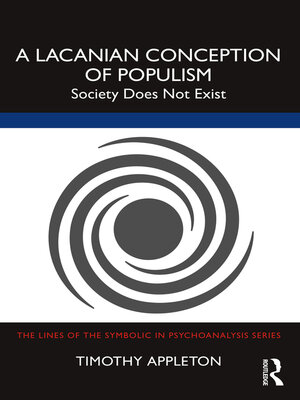A Lacanian Conception of Populism
ebook ∣ Society Does Not Exist · The Lines of the Symbolic in Psychoanalysis Series
By Timothy Appleton

Sign up to save your library
With an OverDrive account, you can save your favorite libraries for at-a-glance information about availability. Find out more about OverDrive accounts.
Find this title in Libby, the library reading app by OverDrive.



Search for a digital library with this title
Title found at these libraries:
| Library Name | Distance |
|---|---|
| Loading... |
A Lacanian Conception of Populism takes issue with traditional theories of populism, which seek to equate populism with hegemony, arguing that these are not only different but even incompatible logics.
Timothy Appleton contends that one of the main differences between populism and hegemony has to do with the social totality: while hegemony absolutises it, populism eviscerates it, setting in its place an (apparently paradoxical) dispersion of singular instances of 'the people'. The book considers the work of Laclau, Badiou, Žižek and Rancière, before arriving at a novel conceptualisation that Appleton dubs 'the populism of singularities'. In the second half of the book, the author draws out the consequences of this concept for contemporary political theory: the question of how to define 'left' and 'right'; the question of popular enthusiasm and affect; 'truth' versus 'post-truth'; the question of leadership; populism and nationalism; and the relation between populism and political parties.
A Lacanian Conception of Populism will be key reading for academics and scholars of political theory, political philosophy, post-Marxist thought, discourse theory and psychoanalysis. It will also be of interest to those working in the areas of populism studies, cultural studies, gender studies and queer theory.







